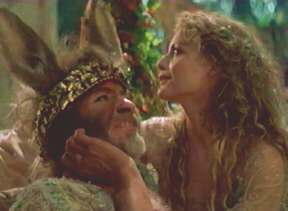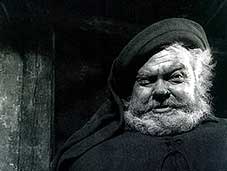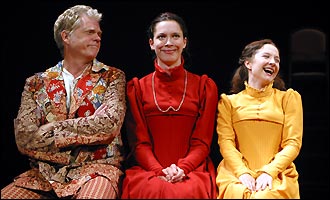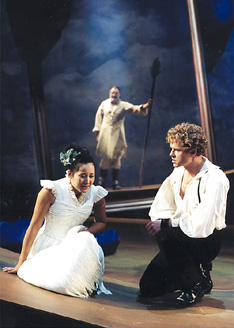 by Picasso
by PicassoThe Droeshout Engraving
 by Picasso
by Picasso

Teaching Shakespeare
ED 406
Dr. Richard Regan
DMH 103
Fall 2011
This course is designed to prepare secondary school teachers to teach the Shakespeare plays most frequently offered in secondary schools. Through class conversations and activities we will develop and share productive approaches to the plays on various grade levels.
To approach Shakespeare's complex language, we will use a multimedia approach in our classroom, watching a production on one screen while reading the text of the play on an adjacent screen. This pedagogical approach will serve as both a model for teaching Shakespeare and as a site for discussion of the various ways to teach Shakespeare.
I have a library of 250+ video clips stored in iTunes University, password protected for students with a NetID from Fairfield U.
For each week there are suggestions for teaching the plays, with focus points below on this page, and topics to be explored in the "Class" link for each play. For each play there are sample online lesson plans (LP) demonstrating various approaches to teaching the play. These plans will guide our conversations about particular methods for reading and teaching of the play(s) at hand.
We will use as continuing resources the following books and websites:
Shakespeare Without Fear: Teaching for Understanding
Mary Janell Metzger, Western Washington University
ISBN 978-0-325-00645-1 / 0-325-00645-8 / 2004 / 144pp / paperback Imprint: Heinemann
Amazon
Unlocking Shakespeare's Language: Help for the Teacher and Student (Theory and Research Into Practice)
Randal F. Robinson
NCTE [Paperback] 1988
ISBN-10: 0814155685 ISBN-13: 978-0814155684
Amazon
An Introduction to Shakespeare and the Elizabethans
Teaching resources for learning about Shakespeare's Elizabethan Age
M. C. Bard: Hip Hop and Shakespeare
In this lesson, students will compare lyrics from hip hop songs with monologues from Shakespeare’s plays, and perform both for the class.
To begin developing our own Shakespeare pedagogies, spend some time with these rich online resources:
Online Resources for Teachers from the Folger Shakespeare Library
Teachers First: Resources for Shakespeare
In Search of Shakespeare (PBS)
Shakespeare in Education
Cambridge School Shakespeare: a brilliant series of volumes with pedagogy projects on the most widely taught plays:
Antony and Cleopatra, As You Like It, Hamlet, Julius Caesar, Henry IV, Henry V, King Lear, Richard III, Macbeth, The Merchant of Venice, A Midsummer Night's Dream,
Much Ado About Nothing, Othello, Romeo and Juliet, The Taming of the Shrew, The Tempest, Twelfth Night, The Sonnets, Teaching Shakespeare
These volumes are in the Fairfield University library, with editors and call numbers listed on the Excel download.
Course Objectives (IDEA Center)
Essential: Developing specific skills, competencies, and points of view needed by professionals in the field...(#4)
Important: Learning to apply course material (to improve thinking, problem solving, and decisions) (#3)
Important: Learning to analyze and critically evaluate ideas, arguments, and points of view (#11)
This course will fulfill the following NCTE/NCATE Program Standards with special reference to multimedia pedagogy and secondary students’ creation of media. For each play, standards will be cited that explain the emphasis of that class.
Knowledge of the practices of oral, visual, and written literacy:
- Create opportunities and develop strategies that permit students to demonstrate, through their own work, the influence of language and visual images on thinking and composing; (3.2.1)
- Demonstrate a variety of ways to teach students composing processes that result in their creating various forms of oral, visual, and written literacy; (3.2.3)
- Engage students in activities that provide opportunities for demonstrating their skills in writing, speaking, and creating visual images for a variety of audiences and purposes; (3.2.4)
Knowledge of reading processes: (Texts will be presented as media and peformance in addition to print sources.)
- Integrate into their teaching continuous use of carefully designed learning experiences that encourage students to demonstrate their ability to read and respond to a range of texts of varying complexity and difficulty; (3.3.1)
- Integrate into students' learning experiences a wide variety of strategies to interpret, evaluate, and appreciate texts and assess the effectiveness of such strategies in promoting student learning. (3.3.3)
Knowledge of the range and influence of print and nonprint media and technology in contemporary culture:
- Understand media’s influence on culture and people’s actions and communication, reflecting that knowledge not only in their own work but also in their teaching; (3.6.1)
- Use a variety of approaches for teaching students how to construct meaning from media and nonprint texts and integrate learning opportunities into classroom experiences that promote composing and responding to such texts; (3.6.2)
- Help students compose and respond to film, video, graphic, photographic, audio, and multimedia texts and use current technology to enhance their own learning and reflection on their learning. (3.6.3)
Knowledge of research theory and findings in English language arts:
- Reflect on their own teaching performances in light of research on, and theories of, how students compose and respond to text and make adjustments in their teaching as appropriate; (3.7.1)
- Use teacher-researcher models of classroom inquiry to analyze their own teaching practices so they can better understand what enables students to speak, listen, write, read, enact, and view effectively in varying learning situations. (3.7.2)
GSEAP Candidate competencies:
2. Candidates demonstrate competence (e.g. skills) in designing, implementing, and assessing developmentally appropriate and effective instruction and/or intervention.
Teaching Shakespeare will require students to develop lesson plans for teaching Shakespeare plays in new ways, emphasizing the coordination of media and text.
6. Candidates integrate technology and information literacy in their instruction and professional practice.
Students will be encouraged to develop multimedia presentations in several forms, including the production and editing of digital clips.
Office hours: Thursdays 3-4:30
Also before and after class, and by appointment. I am always available by email.
Texts: Signet Classic editions of the plays listed below. These inexpensive editions have excellent Introductions, notes, and critical articles. We can modify my preliminary list of plays to include other titles your school may include in its curriculum.
Evaluation: The course grade will be based on class discussion and weekly journal entries (25%), a classroom presentation on a play (25%), and two final written projects (25% each) describing classroom approaches to one or more plays.
Class discussion and weekly journal entries:
Each play listed below has a hyperlink to a "Class," a multimedia essay on the play. At the bottom of each Class page is a section called "Journal Notes" with prompts for topics and problems related to teaching that play. Your Journal entries (2-5 pages) should frame the main questions and topics for our next class meeting, exploring ideas and challenges for teaching different aspects of the play. Please email me your Journal Notes a day before the class session so I can read them and pool our ideas for class. Our shared experiences will be the center of class the next day.
Classroom Presentation on a play:
Once during the course you will present a 45 minute lesson on a play of your own choosing to our class. The lesson should draw on course discussions and readings to determine the pedagogical strategies used to teach the play. Through class reflection on the lesson, you will have the chance to develop and refine your teaching approaches as we all participate as your students and then as fellow teachers reflecting on the lesson.
Final written projects:
Part 1 (25%) Create a portfolio using your Journal Notes and Classroom Presentation, and write a metanarrative (summary essay) in which you assess your newly found and developed approaches to Shakespeare in the classroom (8-10 pages).
Part 2 (25%) An exploration and discussion of the pedagogical challenges of teaching Shakespeare in the secondary school classroom, together with an instructional unit that teaches a play or plays at your home institution.
Writing Portfolios: What Teachers Learn…
You should submit written work electronically, written in Microsoft Word. Word has a feature called Track Changes which we can use to write comments on papers (in color). Click here to download a document that contains some suggestions for writing in Word and for emailing papers as attachments.
Students with documented learning disabilities, please see me. Alternative methods of testing and evaluation are available.
Some fine Shakespeare productions can be viewed from this Library link:
http://ativ.alexanderstreet.com.libdb.fairfield.edu/Search/PersonID/219589/tab/video
Macbeth, with Anthony Sher
Measure for Measure, 2006 film
As You Like It, Globe Theater
Hamlet, with Kevin Kline
The Taming of the Shrew, American Conservatory Theater
King Lear, with James Earl Jones
Much Ado About Nothing, New York Shakespeare Festival
Powerpoint Slide Shows from Hardy Cook and the Shaksper archives
Shakespeare's Life
Shakespeare's Theater
Shakespeare's Texts
The Elizabethan World Picture
Theater related websites
"The Elizabethan Theatre": a lecture with slides
Designing Shakespeare (home)
Designing Shakespeare (digital resources)
Shakespeare in Performance Institute Acting Exercises
Interactive Shakespeare Project
Touchstone: Shakespeare in Performance
Terry Gray's Mr. William Shakespeare and the Internet
Encyclopaedia BritannicaWas Shakespeare Shakespeare? The Authorship Controversy
The Shakespeare Discussion List Archive
Teachers FirstPolydore Vergil's Anglica Historica (1555)
Podcasts
American
Shakespeare Center
The ASC offers a number of different podcasts, including This Week at the
Blackfriars, the Blackfriars Backstage Pass, the American Shakespeare Center
Chronicles, and Doctor Ralph Reveals All.
You can find links to all of these podcasts at the American Shakespeare Center's
Podcast Central; you can also subscribe to all ASC podcasts through the iTunes
Music Store Podcast Directory, or through any number of web-based podcasting
sites, including Podcast
Pickle.
American Shakespeare Podcast Central (Blackfriars Playhouse)
Mobile Phone Shakespeare
iTunes Store: Search <Shakespeare> for a free app for the iPhone with searchable text
Mobile Open Source Shakespeare
Here are the instructions for viewing the Class pages and video clips. You'll need a password from Dr. Regan: rjregan@mail.fairfield.edu
Streaming
video is a part of the course because I've written classes to be interactive
with excerpts from performances. You will need a broadband internet connection.
Cable or DSL will work. Satellite is probably OK too. Dialup is too slow for
video.
As you scroll down the course page, for each of the plays you will see a link
called "Click." That will take you to the Class, and when you click
on a video clip you will see a password box. The password will be given out
in class, a security measure because the TEACH Act passed by Congress in 2002
allows only enrolled students to have access to copyrighted materials for educational
purposes. Our method of streaming will open the clip on your computer in QuickTime,
though if you are a Windows user RealPlayer may open it instead. QuickTime comes
standard on Macs, and if you Windows users do not have it, you can download
it (bundled with iTunes) from:
http://www.apple.com/itunes/download.
These video clips are also available from iTunes University, together with audio podcasts of our classes and some documents for each play. The clips can be expanded to full screen. Documents can be viewed as .pdf files only in iTunes, but the audio and video files can be synched to your iPod. If you are on the class roster, you have access through:
Enter your NetID number as your user name. The password is your Fairfield email password. This login will work as soon as the class begins.
If you are a Windows user, you can get iTunes free at:
http://www.apple.com/itunes/download/ (scroll to the Windows links)
Schedule
September 8 - Introduction, Theory of Comedy, review and discussion of current practices for teaching Shakesperare's plays. The following list of plays can be modified easily to exclude or include other titles. We might eliminate a history play, for example, or add a comedy or tragedy.
As we begin to study the plays, we will concentrate on reading closely by viewing the text on screen while simultaneously viewing a production on an adjacent screen. I'll freeze the production video while highlighting the text, so we can do close analysis and learn just what Shakespeare is saying through his characters and how we can support secondary students attempting to engage with this text.
The Internet Shakespeare Editions
September 15 - The Taming of the Shrew

Read: the play and the Signet Introduction, and the articles by Mack, Greer, Bamber, Newman, and Slights
CLICK to go to the Class on the play.
Teaching focus: How to teach the words. Showing how Shakespeare uses language is crucial to understanding and teaching the play.
- Create opportunities and develop strategies that permit students to demonstrate, through their own work, the influence of language and visual images on thinking and composing (3.2.1)
It's All in the Way You Say It (LP)
Interpretation focus: Understanding meaning and character in a play with several plots:
"Personations:
The Taming of the Shrew..."
"'Caparisoned
like the horse': Tongue and Tail in Shakespeare’s The Taming of
the Shrew"
"A Shrew and The Shrew"
The
Works of the Bard: including a SEARCH engine
Scanning
Shakespeare's Lines
(click on Teacher's Guide, then Scansion Guide)

Read: the play and the Signet Introduction, and the articles by Goldman, Snyder, and Novy
CLICK to go to the Class on the play.
Teaching focus: How to use audio and video resources. The recent film directed by Baz Luhrmann translates the play into contemporary culture and presents insights into teaching students. Shakespeare's text is presented through the lens of contemporary media. Teachers can use media like film to deepen understanding of the play.
- Understand media’s influence on culture and people’s actions and communication, reflecting that knowledge not only in their own work but also in their teaching (3.6.1)
- Use a variety of approaches for teaching students how to construct meaning from media and nonprint texts and integrate learning opportunities into classroom experiences that promote composing and responding to such texts (3.6.2)
Teaching Romeo and Juliet (LP)
Interpretation focus: Understanding tragedy and comedy in a Shakespeare film:
"Baz Luhrmann's Romeo and Juliet: Kitsch and Tears"
"Shakespeare and the Tragic Virtue"
Bibliography on Shakespeare's Women

Read: the play and the Signet Introduction, and the articles by Myers, Kermode, Bamber, and Slights
CLICK to go to the class on the play.
Teaching focus: How to study Shakespeare's life and times. From a basic understanding of the world in which Shakespeare wrote, through simple interpretations of plot and character, to a vision of the role of the artist as creator and magician, this play holds the full range of Shakespeare's art.
- Reflect on their own teaching performances in light of research on, and theories of, how students compose and respond to text and make adjustments in their teaching as appropriate (3.7.1)
Teaching A Midsummer Night's Dream (LP)
Very Tragical Mirth (LP)
Interpretation focus: Understanding Shakespeare's ideas about writing a play:
"...Petrarch and Pyramus in the Woods of Athens"
"From the Ridiculous to the Sublime"
A Study Guide to A Midsummer Night's Dream

Read: the play and the Signet Introduction, and the articles by Ornstein, Kahn, and Goldman
CLICK to go to the class on the play.
Teaching focus: How to study history according to Shakespeare. Teaching the history play requires basic presentations of fact and development through writing on the play. Creating visuals through slideshows and media clips is essential to translate the distant world of the Early Modern period.
- Engage students in activities that provide opportunities for demonstrating their skills in writing, speaking, and creating visual images for a variety of audiences and purposes (3.2.4)
Teaching Henry IV, Part One (LP)
Interpretation focus: Understanding fathers and sons:
Fathers and Sons (lesson plan)
"The Prudence and Kinship of Prince Hal..."
"Hal Imitates the Sun" (Part Two)
"Holy War in Henry Fifth" (Henry V)
October 13 - Julius Caesar

Read: the play and articles by Mack and Kahn
CLICK to go to the class on the play.
Teaching focus: How to approach tragedy. Tragedy is such a philosophical form that students need to use basic writing on key concepts and graphics as building blocks to clarify complex ideas. From short form essays to collaborative writing, composition exercises sharpen and develop basic skills.
- Demonstrate a variety of ways to teach students composing processes that result in their creating various forms of oral, visual, and written literacy (3.2.3)
Teaching Julius Caesar (LP)
Julius Caesar Web Guide (including classical background) (LP)
Interpretation focus: Understanding tragic protagonists:
"Caesar"s Reviving Blood: Shakespeare and the Religion of Revolution"
William Shakespeare's Julius Caesar (from Perseus at Tufts)
"An English Renaissance Understanding of the Word 'Tragedy'"
"Shakespeare and the Tragic Virtue"
October 20 - Twelfth
Night (OR As You Like It)

Read: the play and the Signet Introduction, and the articles by Bamber, Kimbrough, and Howard
Romantic comedy, with an inlay of literary romance
CLICK to go to the class on the play.
Teaching focus: How to approach comic characters. The class will be divided in two, and each half of the class will study and present teaching suggestions for one of these two comedies. As You Like It and Twelfth Night have striking similarities and differences which are further complicated by clips from different productions in different media (studio television, film, taped live theater).
- Integrate into their teaching continuous use of carefully designed learning experiences that encourage students to demonstrate their ability to read and respond to a range of texts of varying complexity and difficulty (3.3.1)
Mistaken Identities (LP)
Tangling Up the Love (LP)
Interpretation focus: Understanding comedy through performance:
"Trevor Nunn's Twelfth Night": Contemporary Film and Classic British Theatre"
"The BBC Twelfth Night: Relationships Revealed"
"...the Nature of Shakespearian Comedy"
October 27 - As You Like It

Read: the play and the Signet Introduction, and the articles by Gardner, Erickson, and Howard
CLICK to go to the class on the play.
Teaching focus: How to approach comic characters. The class will be divided in two, and each half of the class will study and present teaching suggestions for one of these two comedies. As You Like It and Twelfth Night have striking similarities and differences which are further complicated by clips from different productions in different media (studio television, film, taped live theater).
- Integrate into their teaching continuous use of carefully designed learning experiences that encourage students to demonstrate their ability to read and respond to a range of texts of varying complexity and difficulty (3.3.1)
Playing the Fool (LP)
Interpretation focus: Understanding comedy through performance:
"Instruction Versus Deception: from Rosalynde to As You Like It"
The Works of the Bard: including a SEARCH engine
Shakespeare: Subject to Change (Cable in the Classroom)
November 3 - Hamlet

Read: the play and the Signet Introduction, and the articles by Mack, Ornstein, Heilbrun, and Belsey
CLICK to go to the class on the play.
Teaching focus: How to approach the characters of tragedy. In this two week segment on Hamlet, students will have a chance to collect and analyze many video clips from at least six different productions, and to produce their own media based pedagogies.
- Help students compose and respond to film, video, graphic, photographic, audio, and multimedia texts and use current technology to enhance their own learning and reflection on their learning (3.6.3)
The Female Victims in Hamlet (LP)
Hamlet, Ophelia, Madness (LP)
What Is Hamlet Thinking? (LP)
Inside Hamlet (LP)
Teaching Hamlet (LP)
Introducing the Ghost (LP)
Interpretation focus: Understanding the puzzle of a complex play:
"Shakespeare and the Public Discourse of Sovereignty: 'Reason of State' in Hamlet"
"Who Knows Who Knows Who’s There? An Epistemology of Hamlet (Or, What Happens in the Mousetrap)"Enfolded Hamlet
"On Seeing Madame Bernhardt's Hamlet"
"Multiplicity of Meaning in the Last Moments of Hamlet"
Hamlet on the Ramparts (see "Films")
"'Too Much in the Black Sun': Hamlet's First Soliloquy, A Kristevan View
"An English Renaissance Understanding of the Word 'Tragedy'"
"Shakespeare and the Tragic Virtue"
November 17 - Othello

Read: the Play and the Signet Introduction, and the articles by Mack and Sprengnether
CLICK to go to the class on the play.
Teaching focus: How to approach a social outsider as a tragic figure. Othello is a play which demands both symbolic and psychological interpretation. Beginning with the geography of Europe and the Mediterranean world, teachers and students need to investigate the cultural and historical background of racial stereotyping and also the dominant Christian theology of Shakespeare's England which provides the main symbolic language of the play.
- Integrate into students' learning experiences a wide variety of strategies to interpret, evaluate, and appreciate texts and assess the effectiveness of such strategies in promoting student learning (3.3.3)
Teaching Othello (LP)
Fear and Loathing in Othello
Imagery in Othello (LP)
MTV Othello (LP)
Othello and Desdemona (LP)
Interpretation focus: Understanding the social and religious symbolism of a Shakespeare play:
"'That Which Heaven Hath Forbid the Ottomites':The Turks in Shakespeare's Othello"
Shakespeare on Screen: Threshold Aesthetics in Oliver Parker's Othello
(access to video clips)
Cinthio's Tale: The Source of Shakespeare's Othello
December 1 - King Lear

Read: the Play and the Signet Introduction, and the articles by Mack, Bamber, and Brown
CLICK to go to the class on the play.
Teaching focus: How to approach a philosophical tragedy. This play is the most deeply philosophical of Shakespeare's tragedies, and to develop teaching practices we will study models of classroom inquiry and carry them forward for the rest of the course. This methodology will be important to students' Classrom Presentations and final written projects.
Teaching King Lear (LP)
Astrologers and Sceptics in King Lear (LP)
King Lear's Storm (LP)
Parents and Children (LP)
Questions of Kingship in King Lear (LP)
Interpretation focus: Understanding the performance challenges of a Shakespeare play:
"King Lear in its Own Time: The Difference That Death Makes"
Joyce Carol Oates, "Is This the Promised End..."
"Faires and Gods: A Socio-Religious Context for King Lear
PBS Site on Ian McKellan's Lear
"King Lear Beyond Reason: Love and Justice in the Family"
"Performing the Bodies of King Lear"
(see "Introductory notes on Tragedy" links)
A Hypertext Version of King Lear
December 8 - Macbeth

Read: the Play and the Signet Introduction, and the articles by McCarthy, Klein, and Sinfield
CLICK to go to the class on the play.
Teaching focus: How to approach a tragedy with a villain/hero. We will review a variety of lesson plans and discuss which ones seem most promising. We will continue to develop teaching practices , and we will study models of classroom inquiry.
Teaching Macbeth - Resources from Folger Education
Lesson Plans Archive - Folger Shakespeare Library
Interpretation focus: Understanding adaptations of a Shakespeare play:
The Purgation of the Hero in Shakespearian Tragedy
Film Adaptations:
December 15 - The Tempest

Read: the play and the Signet Introduction, and the articles by Leininger and Greenblatt
Dante's definition of allegory
CLICK to go to the class on the play.
Teaching focus: How to approach a symbolic play.
Teaching The Tempest (LP)
Ariel, the (occasionally) tricksy spirit (LP)
Tempest in the Lunchroom (LP)
The Tempest: Picture Poems (LP)
Interpretation focus: Understanding literary romance:
"Natural and Colonial Education in Shakespeare's The Tempest